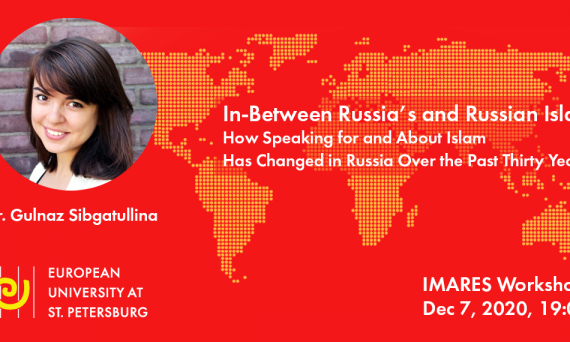Platform: Zoom
The economic, social, and political transformations of the immediate post-Soviet decennium and the period under Putin have contributed to shaping a unique phenomenon commonly (though imprecisely) referred to as post-Soviet Russia’s Islam. From a severely repressed religion under communism, Islam resurged during the brief period of relaxed state control in the 1990s, which enabled the emergence of a broad spectrum of Muslim organizations, mass media, political parties, and leaders with competing agendas. Even though in the aftermath of the First and especially the Second Chechen wars (1994–1996, 1999–2009) the circle of religious freedom shrank visibly, the public discourse in the 2000s offered just enough space for a number of alternative definitions of Islam. Can we say the same about the 2010s?
This lecture aims to recap significant shifts in the discourses on religion in general, and on Islam, in particular in the last thirty years. By focusing on rhetorical strategies of various actors—the state, the Russian Orthodox Church, the institutionalized Muslim leaders, converts to Islam—in this lecture, Dr. Sibgatullina sketches the ever-changing boundaries between “good”, that is legal and even welcomed, and “bad”—dangerous and banned—Islam. What is russkii Islam, and how does it differ from rossiiskii? Who determines what the term “traditional Islam” entails? And how does secular Soviet and academic literature help to legitimise certain Islamic practices?
Dr. Gulnaz Sibgatullina is a postdoctoral research fellow at the University of Amsterdam. Her research interests lie in the intersection of several fields: (post)colonial translation studies, Muslim-Christian relations, and Islam in Europe. In 2019 she obtained a Ph.D. degree at Leiden University (the Netherlands); her dissertation on Languages of Islam and Christianity in Post-Soviet Russia was published as a monograph at Brill in 2020. Currently, she is a member of the ERC-funded “The European Qur’an(EuQu)” project and examines the politics of the Qur’an translation under the Tsars. In 2021–2024, she will collaborate with the Institute for European, Russian and Eurasian Studies at George Washington University in studying networks of European converts to Islam.
The IMARES Workshop Series hosts prominent representatives from the fields of academia, business, and politics. IMARES program guest speakers share their knowledge and experience by touching upon a variety of topics related to Russian and Eurasian Studies. The lectures are followed by a Q&A session.
